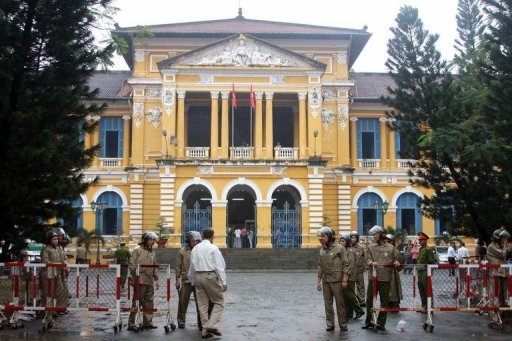MISRATA: Libya’s tribes issued a statement on Wednesday calling for Moamer Qaddafi to cede power, after rebels fighting to oust the
strongman were said to be gaining ground.
Chiefs or representatives of 61 tribes from across the North African country called for an end to Qaddafi’s four-decade rule in a joint statement released by French writer Bernard-Henri Levy.
"Faced with the threats weighing on the unity of our country, faced with the maneuvers and propaganda of the dictator and his family, we solemnly declare: Nothing will divide us," said the text, drawn up in Benghazi on April 12.
"We share the same ideal of a free, democratic and united Libya," it said.
The call came a day after British Defense Secretary Liam Fox said Libyan rebels appeared to be gaining ground against Qaddafi, despite a deadly attack by his forces on the port of the besieged western city of Misrata.
"We’ve seen some momentum gained in the last few days. We’ve seen some progress made in Misrata. And it’s very clear that the regime is on the back foot," British Defense Secretary Liam Fox said on Tuesday.
After talks at the Pentagon with US Defense Secretary Robert Gates, Fox painted an optimistic picture of the conflict despite fears the war could turn into a stalemate.
But the military spokesman in the rebels’ eastern stronghold of Benghazi said Qaddafi was determined to destroy Misrata’s port, a conduit for military and humanitarian aid for insurgents in the west.
"This port is too much of a headache for Qaddafi so he wants to destroy it at whatever cost," Colonel Ahmed Omar Bani, military spokesman of the Transitional National Council, told AFP.
Bani said "revolutionaries" on the ground were doing their best to "save and protect" the port but it was an uphill battle as they were outgunned by Qaddafi’s long-range weapons.
"He is using missiles from 30-40 Kilometers away, so it is impossible for us to stop those missiles with the light weapons that we have in Misrata." Hitting Qaddafi’s troops, he said, remained a challenge even for NATO’s forces as loyalists were using civilian areas in the outskirts — schools, shops and even farms — to hide troops and weapons.
"It is still hard for NATO to catch them. Qaddafi is staying far from the centre because it is safe for him," he said, warning that losing the port would be a "real disaster," leaving civilians stranded without aid.
He warned Qaddafi could take "revenge" on the city that rose up against him on February 19, two days after Benghazi.
"This is the culture of Qaddafi: revenge, revenge, revenge. If this port fell down, what will happen to civilians is the question?"
The African Union meanwhile urged an end to military actions targeting senior Libyan officials and key infrastructure, after the United States and Britain had said it was legitimate to strike Qaddafi’s compound, as NATO did two days ago.
"Council urges all involved to refrain from actions, including military operations targeting Libyan senior officials and socio-economic infrastructure, that would further compound the situation and make it more difficult to achieve international consensus on the best way forward," the AU said.
Qaddafi’s chief ally in Latin America, Venezuelan President Hugo Chavez, had previously accused NATO of trying to kill his "friend."
On Tuesday, Gates and Fox insisted command centers for the regime’s forces were legitimate targets.
"We have considered all along command and control centers to be a legitimate target and we have taken those out elsewhere," Gates told reporters.
Fox agreed and said "as long as that government continues to target civilians… we will continue to regard all their command-and-control mechanisms as legitimate targets."
Tripoli said late Tuesday it had asked Russia to convene an urgent meeting of the Security Council over what it called an "assassination attempt" on Qaddafi when the NATO raid destroyed his office on Sunday night.
NATO said meanwhile it was considering sending a civilian "contact point" to Benghazi in order to improve political relations with the opposition.
As the United States and its allies pondered how to help the rebels, US President Barack Obama formally ordered a drawdown of $25 million in urgent, non-lethal aid to the Transitional National Council.
On Tuesday, Qaddafi forces fired Grad rockets at Misrata’s port, killing at least three refugees and forcing an aid ship that had been due to rescue 550 African refugees to stay out to sea.
At least three African refugees were killed, a medic and a Western journalist said. The medic spoke of "around 20 wounded."
Witnesses in the northwestern town of Kabao reported insurgents fought heavy battles against Qaddafi’s forces, leaving dozens of regime troops dead and many captured.
Witnesses said 45 loyalists were killed and 17 detained around the town of 15,000 people 50 kilometers (30 miles) east of Nalut. Two rebels were killed and three wounded on Monday.
UN Secretary General Ban Ki-moon, meanwhile, said Qaddafi’s regime "has lost both legitimacy and credibility, particularly in terms of protecting its people and addressing their legitimate aspirations for change."

